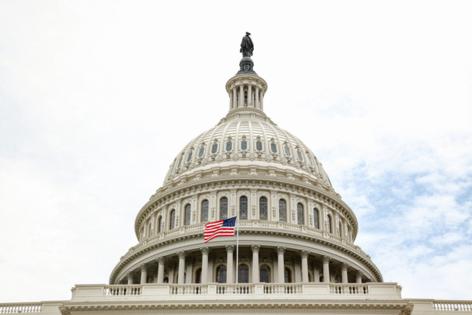Senators face crucial vote on $9.4 billion rescissions package
Published in News & Features
A key test of Republicans’ appetite to defend Congress’ power of the purse arrives this week with the expected vote in the Senate on a White House proposal to cancel billions in previously agreed-to spending on foreign aid and public media broadcasting.
The Senate could vote as soon as Tuesday on a procedural motion on the Trump administration’s request to rescind $9.4 billion in appropriations, including $8.3 billion in international assistance and $1.1 billion in funding for the Corporation for Public Broadcasting, which helps fund NPR and PBS.
Only a simple majority is needed to bring the package to the Senate floor, which means Republicans can afford to lose just three votes from their side.
Senate GOP leaders sounded far from certain on Monday afternoon that they had the minimum votes needed to agree to a discharge motion. When asked if Republicans had enough votes to get on the bill, Senate Majority Leader John Thune, R-S.D., said negotiations were still ongoing on potential amendments.
“There’s been a lot of back and forth, as you might expect,” Thune said during remarks to reporters. He indicated that support would hinge on what amendment Republicans can agree on in advance.
Missouri Republican Sen. Eric Schmitt told reporters late Monday that the White House has been “very engaged” in shoring up GOP support, with Office of Management and Budget Director Russ Vought expected on the Hill Tuesday.
Thune said he was hopeful the Senate would have two procedural votes Tuesday, one on the discharge motion and another on proceeding to the bill that, if successful, would pave the way for amendments votes.
“We’re hearing people out and we are obviously weighing what an amendment process on the floor … might look like, what if any changes could be made in advance of the floor,” Thune said.
All eyes are on a few Republican holdouts like Sens. Mike Rounds of South Dakota, Susan Collins of Maine and Lisa Murkowski of Alaska, who have raised objections to the White House’s push to repeal support for CPB and to cut funding for a popular anti-HIV/AIDS program that benefits Africa.
Senate Republicans are hoping to avoid a repeat of 2018, when their efforts to bring a rescissions package during Trump’s first administration were derailed by a surprise “no” vote from then-Sen. Richard M. Burr. The North Carolina Republican was displeased at the time with proposed cuts to the Land and Water Conservation Fund.
The other GOP “no” in that 2018 vote was Collins, who was then chair of the Transportation-HUD Appropriations Subcommittee. “I see this as an institutional issue,” Collins said at the time. “And I believe it is the job of the Appropriations Committee to scrub these accounts with advice from OMB. But I don’t like tipping the power of the purse to the executive branch.”
This time, Collins has more clout to allay her concerns. The current Appropriations Committee chair, Collins could offer a substitute amendment to potentially water down proposed cuts to public broadcasting and the President’s Emergency Plan for AIDS Relief, otherwise known as PEPFAR. The AIDS relief effort, which was created during the George W. Bush administration, has historically had bipartisan backing.
For his part, Rounds has remained optimistic his concerns would be addressed. An appropriator whose rural state’s public radio system is heavily reliant on federal grants, Rounds said last week he has been in negotiations for some time over the proposed cuts to public broadcasting.
Should the Senate amend the White House request, the package would head back the House for consideration, where its fate is less than certain. House Republican leaders barely managed to muscle the House bill through that chamber in a 214-212 vote, with a slim majority that was achieved in large part due to absences on the Democratic side.
The Senate has until midnight on Friday to bring the rescissions bill up for consideration or else it loses its privileged status under a 1974 budget law and would be subject to normal filibuster rules.
If Congress approves the administration’s rescissions request, it would mark the first completed presidential rescissions proposal under the 1974 Impoundment Control Act since fiscal 1999 and the largest in more than four decades, according to the left-leaning Center on Budget and Policy Priorities.
Trump last week urged GOP senators to approve his rescissions request, citing its cuts to public media, which he has frequently accused of bias. He also issued threats against Republican holdouts on his social media site Truth Social.
“It is very important that all Republicans adhere to my Recissions Bill and, in particular, DEFUND THE CORPORATION FOR PUBLIC BROADCASTING (PBS and NPR), which is worse than CNN & MSDNC put together,” Trump posted. “Any Republican that votes to allow this monstrosity to continue broadcasting will not have my support or Endorsement.”
©2025 CQ-Roll Call, Inc., All Rights Reserved. Visit cqrollcall.com. Distributed by Tribune Content Agency, LLC.







Comments